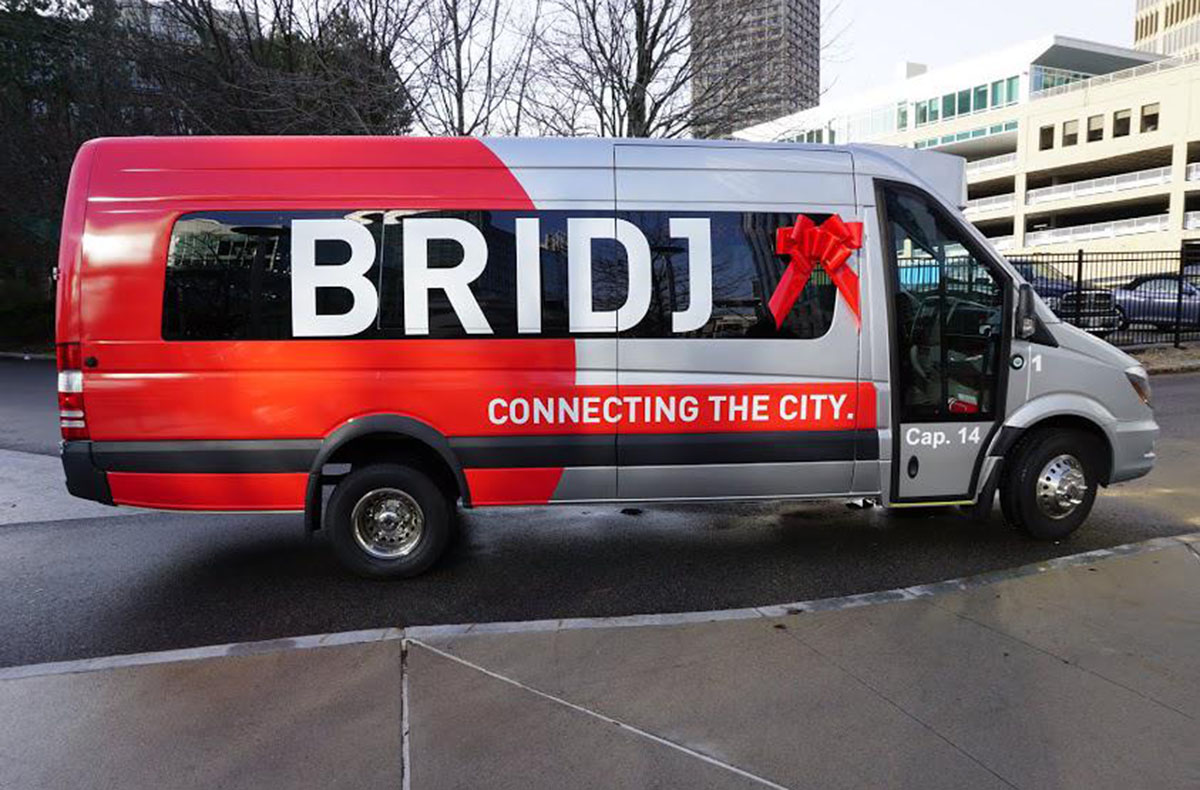MBTA Tech Chief Still Owns Stake in Bridj

Photo courtesy Bridj
The MBTA’s chief technology officer still holds a financial stake in Bridj, even as the Boston-based private transit company has begun preliminary talks with the T to provide late-night shuttle service.
David Block-Schachter briefly worked for the T as its director of research and analytics in 2014 before joining Bridj as the startup’s chief scientist and a member of its founding team. The MIT alumnus then returned to the MBTA this February as its CTO with a focus on the consumer side of tech, and the stated goal of making it easier to ride the T by improving its website and mobile apps.
Bridj presented an early proposal to the MBTA’s Fiscal Management and Control Board this week for a late-night pilot program, in which riders would use the Bridj mobile app to catch a ride on one of 10 buses running five hours a night, 365 nights a year. Citing low ridership and a lack of funds, the five-member oversight board killed late-night service back in February by a 4-0 vote, and can now request more detailed plans from Bridj if interested.
Block-Schachter, however, still owns stock in Bridj. In an ethics disclosure provided by the MBTA and dated February 10, Block-Schachter said he owns a 1-3 percent stake in the form of employee stock options.
“I expect to be involved with multiple procurements and day-to-day decisions that will determine the technology stack that the MBTA use to collect fares, monitor and disseminate vehicle location, and collect and disseminate location and other information from and to its riders,” he wrote. “Any [request for proposal] is unlikely to have Bridj as a direct bidder, but the technology procured may indirectly benefit Bridj and companies like Bridj by, for example, enabling the MBTA to more directly contract with alternate providers’ transportation services.”
Bridj founder and CEO Matthew George would not say whether or not Block-Schachter has exercised his stock options, and instead highlighted the company’s participation in the Fight for $15 pledge.
“From the drivers, all the way up to me, we have an employee stock program that allows our team members to earn stock as part of their compensation package, consistent with other employee friendly companies like Google, Chobani, and Apple,” George said in an email.
Talks between the T and Bridj are still premature, and technically, Bridj isn’t a direct bidder just yet. In his disclosure, Block-Schachter said he would likely “shape any RFP…that involves consumer facing technology”—that is, tech that influences the rider’s experience with the T—and serve on a selection committee separate from the control board, but felt he could perform his duties fairly and objectively.
“It should also be noted that David has no role whatsoever in the proposal that Bridj presented to the Fiscal and Management Control Board,” MBTA spokesperson Joe Pesaturo said in an email Wednesday. “He will not be involved, in any way, shape, or form, in the process of evaluating and/or considering the proposal.”
Under state law, a government employee must disclose in writing any appearance of a conflict of interest to an appointing authority or the State Ethics Commission. In his disclosure filed upon his return to the T, Block-Schachter said his shares of Bridj are not publicly tradable, and “there is no evidence they ever will be.” In the event Bridj completes a round of investment, he cannot exercise his stock option until 90 days later.
“There are a significant number of companies in the same space that Bridj occupies, many of whom are better capitalized, with more advanced technology, and thus are more likely to take advantage of any of the technologies listed above that I might be involved in the procurement of, after the procurement is complete,” he wrote.
“David Block-Schachter is one of the smartest human beings on earth, and the T is lucky to have him on their team,” George said. “We have absolute faith in the T’s internal controls, and we’re looking forward to collaborating with the MBTA to cement Boston’s lead in delivering truly innovative city services.”
The control board, not Block-Schachter, will have final say over the future of late-night service, and whether it involves Bridj or another vendor. The former’s proposal will have to compete with one from TransitMatters, whose “NightBus” plan would run buses every 75 minutes on eight routes from 1-5 a.m. Board members reviewed NightBus in September and encouraged MBTA staff to begin working out the details.
“As far as we know, we can neither comment on nor that are we aware of any conflict of interest of David with this particular process,” said TransitMatters president Marc Ebuña. “He hasn’t been in any of the meetings we’ve been in.”


